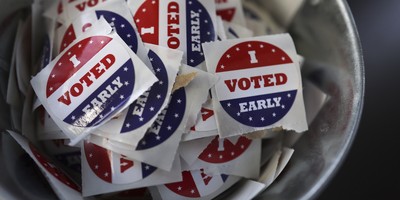Little Noah Markham was one of the tiniest victims of Hurricane Katrina. When the levees broke, Noah was trapped in a flooded New Orleans hospital. It took 10 police officers using flat-bottomed boats to rescue him.
It is an amazing story, but what makes it even more incredible is the fact that—on the day Noah was rescued—he had not yet been born. And no, he was not living in his mother’s womb. Instead, young Noah was living in a canister of liquid nitrogen. He was, in fact, a frozen embryo—a human being at the embryonic stage of life.
On January 16, 2007, 16 months after a policeman grabbed Noah’s home away from home—the canister—he was born.
As Robert George and Christopher Tollefsen observe in their new book, Embryo, if the police had abandoned that canister of liquid nitrogen, “Noah, sadly, would have perished before having the opportunity to meet his loving family.” And so would more than 1,400 other embryos.
Noah, whose parents named him after another flood survivor, is a joyful reminder that embryos are members of the human family—members who are fully human at a very early age. Noah’s life may have begun in an unorthodox manner. But after the doctors implanted him in his mother’s womb, his life was that of a typical embryo: He somersaulted into the fetal stage, and then the infant stage. A few days ago, Noah celebrated his first birthday. God willing, he will grow into a toddler, a teenager, a young man—and in time, an old man.
Recommended
In telling Noah’s story, a web log called All American Blogger said the embryo who became Noah was rescued and defrosted: wrong. As an embryo, Noah was already Noah.
As any embryologist would tell you, human embryos are not a part of an organism, like a heart, a kidney, or a skin cell, George and Tollefsen point out. “Nor are they a disorganized aggregate, a mere clump of cells awaiting some magical transformation. Rather, a human embryo is a whole living member of the species Homo Sapiens—a human being—in the earliest stage of his or her natural development.”
It is important that we understand this, because the lives of many other Noahs are at stake. Too many scientists want people like Noah put to death even before they have a chance to be born; they want to create, and then sacrifice, these young lives in the name of biomedical research—or for profit. In order to do this, they will attempt to convince Americans that people like the embryonic Noah are not fully human—and thus, not worthy of protection in law. And they will want our taxes to pay for their diabolical research.
This is why you and I must tell our neighbors not only about the promising breakthroughs in adult stem-cell research, which does not destroy human lives, but also about the full humanity of the human embryo. Because they are fully human, they are worthy of full moral respect. You do not need to make religious arguments: The scientific arguments will do just fine.
Read Robert George’s and Chris Tollefsen’s new book, Embryo, to learn about why we have a moral obligation to protect humans at every stage of life—even the lives of the smallest people among us.
People like Noah.

























Join the conversation as a VIP Member